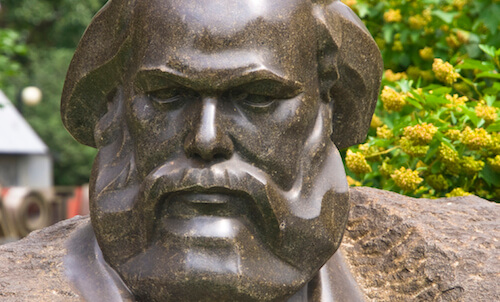Denison was “haunted” by the spectre of Marxism during a two-day celebration of the influential philosopher, economist, sociologist, journalist and revolutionary socialist whose ethos continues to live more than a century after his death in 1883.
Well, we’re playing with words a bit here, acknowledging the beginning of Marx’s “Communist Manifesto” that states a “spectre [is] haunting Europe,” but to some it might really sound like the beginning of a scary ghost story. Marxism, after all, is considered to be a radical, dangerous doctrine, promoted by radical, dangerous people. To think that there could be Marxists on campus really might send shivers down some spines.
The reality is a bit more benign. During the celebration, organized by economics professors Sohrab Behdad and Xiao Jiang, Denisonians crossed departmental lines and discussed their ideologies in an effort to both educate and understand Marxism.
Multiple events gave Denison students, faculty and community members a chance to engage with and discuss the leftist school of thought. Conversation was kicked off with a guest lecture given by none other than the great thinker himself: Karl Marx.
Well, almost. Actor Bob Wieck performed “Marx in Soho,” a one-man play written by historian Howard Zinn, premised on the idea that the “bureaucracy upstairs” agreed to let Marx return to Earth for one hour. The play provides an overview of the work, life and motivation of Marx from his own perspective.
On day two, Denison faculty conducted a discussion about the influence of Marx and Marxism on their academic work. Luis Villanueva, assistant professor of economics, talked about his use of Marx’s ideas in work development economics, and Jiang discussed how he was able to develop a new, and more accurate, measure of national income by using Marxist theory.
Members of the philosophy and English departments were present as well.
Professor Steve Vogel, chair of the philosophy department, identified himself as a “lapsed Marxist” but added that, even though he no longer considers himself a Marxist, he nevertheless believes that Marx has been very significant and that, as a philosopher, Marx “might even have been right about certain things.”
Marx stated “the philosophers have only interpreted the world, in various ways. The point, however, is to change it.” Vogel responded by emphasizing the importance of philosophy working to make the world better. “It can’t just be thinking about things,” he said.
English professor Regina Martin focused on Marx’s influence on the literary story. “In the late seventies, there was a shift from studying literature as literature to studying it as a cultural form,” she said. This new direction in literary studies, one that looked to explain how structures of power influence society, was Marxist in nature. This drew from Marx’s superstructure model, from his ideology and from his interpretation of history.
Behdad’s comments brought the panel to its close and put the celebration into perspective. In Iran, where he had lived and worked for many years, an event like this would not have been possible. In an environment where possession of a Marxist text alone was grounds for imprisonment, any talk of Marx or Marxism had to be conducted either in private or in covert language.
As the event came to its end, the question on the minds of many was whether or not it had succeeded in clearing away some of the misconceptions surrounding Marxism. An exact answer to such a question is difficult to find, but during the following days one could hear classrooms discussing Marxism and students vowing to read the “Communist Manifesto.” If nothing else, then, it at least seemed that an interest in Marxism had been sparked, as well as a willingness to consider the school of thought in a new, less radical light.
So, those afraid of spectres should set their minds at ease. Because Marx isn’t dead.

